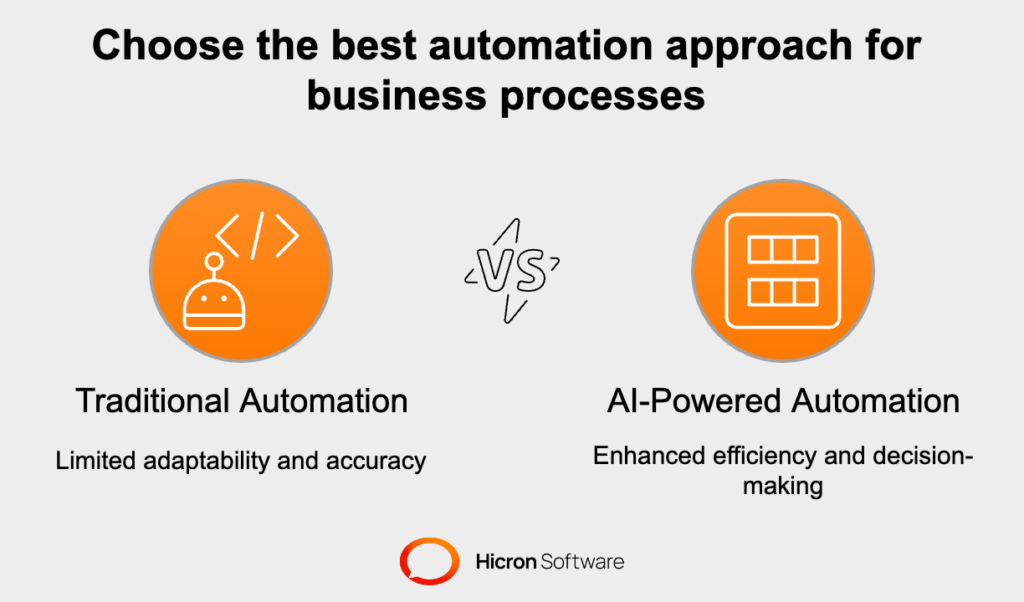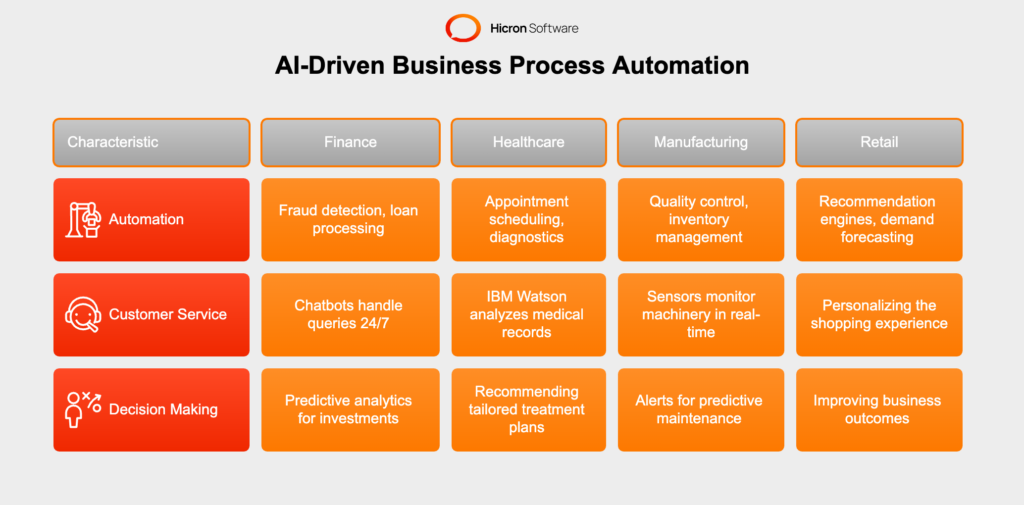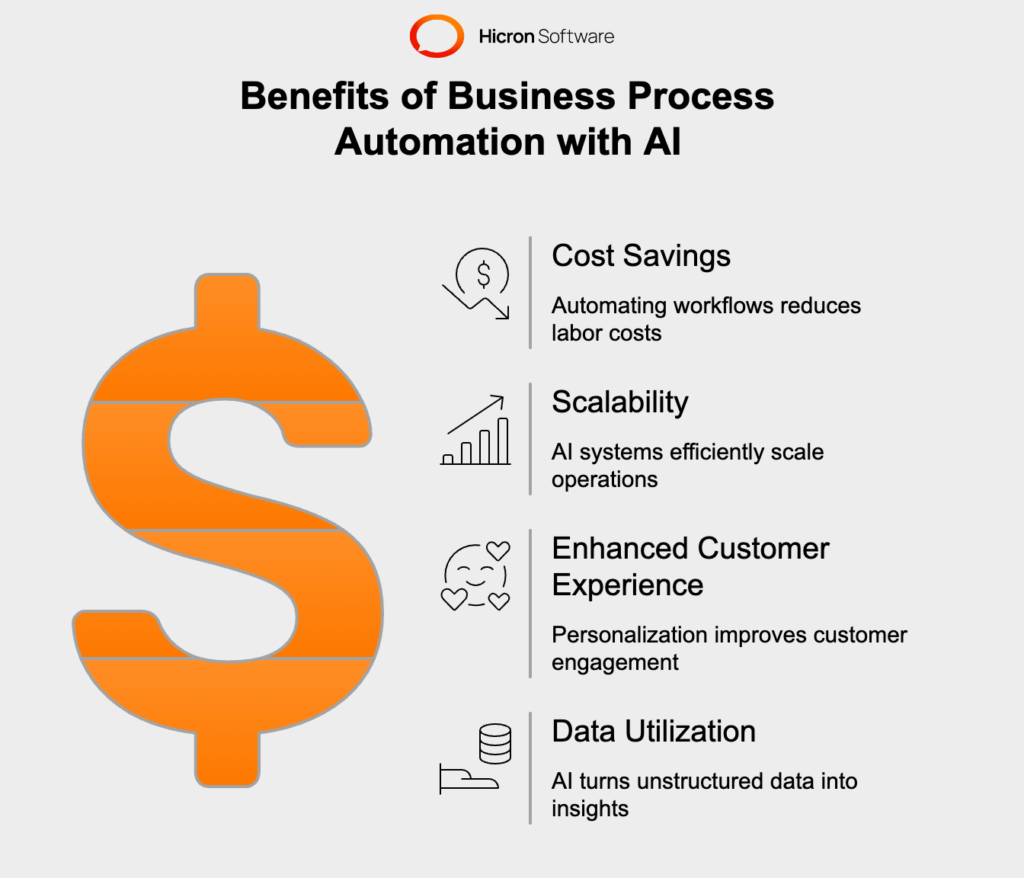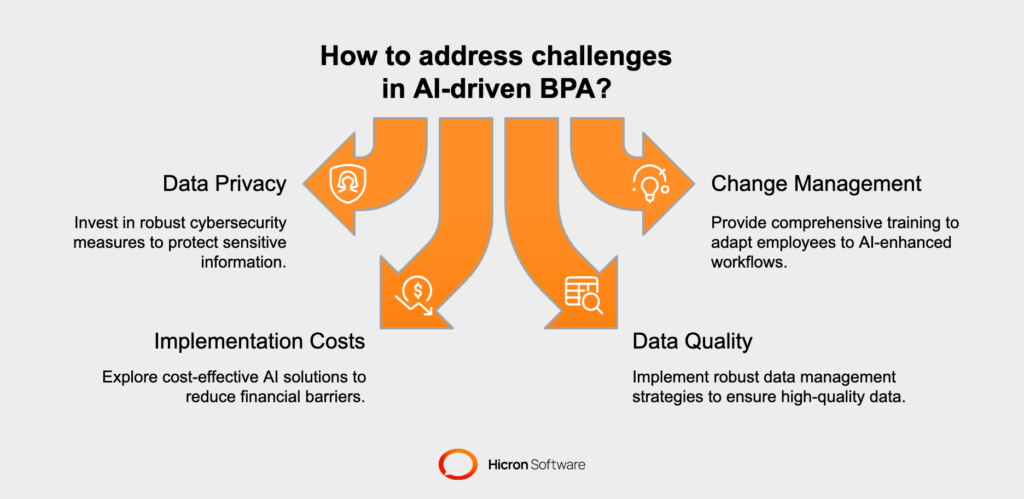What is Automation: Types, Benefits & Use Cases
- October 03
- 9 min

AI business process automation introduces decision-making, predictive analytics, and real-time optimization into everyday operations. Whether it’s processing invoices, managing inventory, or enhancing customer experiences, business process automation with AI transforms how organizations operate.
Imagine streamlining your workflows with technology that learns, adapts, and improves over time. That’s exactly what AI business process automation offers. By combining the intelligence of AI with the structure of process automation, businesses can achieve unparalleled efficiency and accuracy.
At its core, AI business process automation reduces errors, accelerates decision-making, and allows teams to focus on creative and strategic initiatives. From finance and healthcare to manufacturing and retail, its applications are redefining industries and setting new standards for efficiency and innovation.
Artificial Intelligence (AI) is redefining the possibilities of Business Process Automation (BPA), taking automation beyond routine tasks and empowering businesses to operate with unprecedented efficiency. By introducing intelligence into workflows, AI business process automation enhances decision-making, reduces errors, and drives innovation across industries. This combination is not just transforming operations but also shaping the future of how businesses function.

Traditional automation relies on pre-programmed logic to execute repetitive tasks. While this eliminates human intervention, it has limitations when it comes to adaptive decision-making. AI business process automation overcomes this by learning patterns, making predictions, and dynamically adjusting processes without the need for constant human input.
For example, AI-powered robotic process automation (RPA) can process invoices more efficiently in finance departments. By applying machine learning, it detects errors, categorizes expenses, and anticipates anomalies, helping businesses save time and reduce operational inefficiencies.
AI systems learn from vast datasets, which means they can recognize patterns and avoid mistakes that humans or traditional automation might miss. For healthcare providers, for instance, AI-enabled automation systems can analyze electronic health records to find discrepancies or run diagnostics with incredible precision, ensuring fewer human errors in critical environments.
AI business process automation doesn’t just execute – it thinks. Advanced tools like predictive analytics and natural language processing (NLP) allow businesses to anticipate needs and make informed decisions faster. A manufacturing company, for instance, can use AI to predict supply chain disruptions, ensure just-in-time delivery, and optimize production schedules.
|
Aspect |
Traditional BPA |
AI-Driven BPA |
| Decision-making | Rule-based, pre-programmed logic | Adaptive, predictive, and data-driven |
| Scalability | Limited to fixed workflows | Dynamic and scalable across industries |
| Error Reduction | Prone to manual configuration errors | Learns from data to reduce errors |
| Personalization | Minimal personalization ability | Highly personalized using AI algorithms |

AI business process automation has streamlined processes such as fraud detection, loan processing, and risk evaluation. Chatbots in banking are redefining customer service by handling queries 24/7 with high accuracy, while predictive analytics helps financial institutions make smarter investment decisions.
By leveraging machine learning algorithms, institutions are enhancing fraud detection processes, identifying suspicious activities in real time, and minimizing financial losses.
This not only frees up human resources but also enhances customer satisfaction. Meanwhile, predictive analytics tools are transforming investment strategies by analyzing historical and real-time data to forecast market trends, helping financial institutions make smarter, more profitable decisions.
The wide adoption of AI in finance demonstrates its potential to create a more secure, efficient, and customer-centric sector. Financial technology empowered by AI is not just improving operational workflows but also reshaping how institutions interact with data and deliver value to clients, positioning them to thrive in a rapidly evolving economic landscape.
From appointment scheduling to diagnostics, AI business process automation makes healthcare faster and more reliable. Example? IBM’s Watson Health analyzes vast medical records and research papers to recommend tailored treatment plans for patients. From appointment scheduling to advanced diagnostics, AI-powered medical technology is elevating patient care to new heights.
Tools like IBM Watson Health are prime examples of data-driven healthcare solutions in action. Watson Health combs through immense volumes of patient data, medical records, and research publications to deliver tailored treatment recommendations. This approach not only accelerates diagnostic precision but also ensures that treatment plans are evidence-based and personalized to each patient’s unique needs.
The transformation brought by artificial intelligence extends beyond these examples. AI is driving healthcare innovation by enabling predictive analytics, early disease detection, and remote patient monitoring. These advancements represent a new era of data-driven healthcare solutions, where technology empowers providers to deliver smarter, more proactive care. By integrating AI systems, the medical field is achieving a blend of efficiency and empathy, ensuring that patients receive timely, accurate, and effective care.
AI business process automation is vital for quality control, inventory management, and predictive maintenance. For instance, sensors powered by AI monitor machinery in real-time to alert manufacturers of issues before they arise, reducing costly downtimes.
Artificial intelligence in manufacturing is revolutionizing industrial operations by enhancing precision, improving efficiency, and reducing costs. Through industrial automation and smart factories, AI is driving advancements in quality control, inventory management, and predictive maintenance.
Perhaps one of the most impactful applications of AI in manufacturing is predictive maintenance. AI-driven predictive analytics, often combined with IoT sensors, enables real-time monitoring of machinery performance. By analyzing data such as vibration levels, temperature changes, or usage patterns, these systems can predict potential equipment failures before they occur. For instance, sensors powered by AI provide real-time alerts about irregularities, allowing manufacturers to address issues proactively. This reduces costly downtimes, extends the lifespan of equipment, and boosts overall operational efficiency.
The integration of artificial intelligence in manufacturing is not just about automation; it’s about creating smarter, more agile factories. By leveraging intelligent systems, manufacturers can stay competitive in a fast-paced market, achieve greater productivity, and pave the way for innovative industry solutions.
AI business process automation in retail is personalizing the shopping experience. AI now powers recommendation engines, demand forecasting, and inventory optimization to create frictionless customer journeys and improve business outcomes.
Artificial intelligence in retail is revolutionizing the way businesses interact with customers, creating highly personalized shopping experiences and streamlining operations. With advancements in retail analytics and e-commerce innovation, AI is setting new standards for customer engagement and business performance.
AI is at the heart of e-commerce innovation, transforming how retailers operate and how customers shop. By integrating intelligent systems, businesses can improve every touchpoint in the customer’s shopping journey, from discovery to purchase. The result is a more engaged customer base, enhanced loyalty, and stronger business outcomes in an increasingly competitive retail landscape.
AI-driven BPA is revolutionizing operations with numerous benefits:

Despite its potential, integrating AI with BPA isn’t without hurdles:

AI in BPA is evolving rapidly, with exciting trends on the horizon:
The integration of Artificial Intelligence into business process automation isn’t just about making operations faster—it’s about reshaping entire industries. From improving accuracy to streamlining workflows, AI empowers businesses to achieve levels of efficiency and innovation that weren’t possible before.
However, success lies in understanding the capabilities and limitations of AI. By balancing opportunity with preparation—investing in the right technologies, prioritizing data security, and fostering a culture of adaptability—organizations can unlock the true potential of AI-driven BPA.
The future belongs to those who dare to innovate, and AI-driven automation is the key to unlocking businesses’ full potential. If there’s one takeaway, it’s that the role of AI in BPA is only just beginning to show what’s possible. Now is the time to prepare for a smarter, more efficient tomorrow.
Business process automation enhances decision-making by providing accurate data, real-time insights, and predictive analytics. It eliminates manual errors, processes large datasets quickly, and identifies trends to guide informed actions. This ensures smarter, faster decisions that drive efficiency and adaptability.
AI in Business Process Automation refers to the use of artificial intelligence to streamline and optimize workflows. It enables tasks like data processing, decision-making, and error detection to be performed more efficiently and with minimal human intervention.
AI-driven BPA enhances efficiency by automating repetitive tasks, reduces operational costs, improves decision-making with predictive insights, and provides a personalized customer experience. It also helps businesses scale operations seamlessly.
Industries like finance (fraud detection, loan processing), healthcare (diagnostics, appointment management), manufacturing (quality control, inventory management), and retail (personalization, inventory optimization) gain significant advantages from AI business process automation.
AI improves decision-making by providing accurate data analytics, real-time insights, and predictive modeling. It detects patterns, forecasts trends, and minimizes errors, ensuring decisions are faster and more informed.
Popular tools for AI BPA include:
UiPath for robotic process automation.
IBM Watson for advanced data analysis and AI integration.
Automation Anywhere for scalable automation solutions.
Blue Prism for AI-powered intelligent automation.
These tools help businesses implement effective AI-driven process automation based on their specific needs.
AI automation of business processes uses artificial intelligence to perform tasks such as data analysis, decision-making, and workflow optimization without human intervention. It enhances efficiency by automating repetitive, logic-based, or predictive tasks.
Process automation in AI refers to integrating machine learning and AI tools into workflows to automate complex tasks. This includes data processing, predictive analytics, and decision-making, elevating business efficiency beyond traditional automation.
To automate business processes with AI:
Identify repetitive tasks that AI can streamline.
Use AI-powered tools like robotic process automation (RPA) or machine learning models.
Train the AI with relevant data to ensure accuracy and efficiency.
Continuously monitor and optimize AI applications as processes evolve.
The future of AI in business automation includes advancements like hyperautomation (end-to-end process optimization), self-learning systems that improve autonomously, and deeper personalization for customer and employee experiences. AI will continue to drive innovation and efficiency across industries.
AI (Artificial Intelligence): Simulates human intelligence to learn, predict, and adapt.
Process Automation: Focuses on predefined tasks or workflows without adding intelligence.
AI-powered automation combines both, offering adaptive, data-driven decision-making capabilities.
AI automation uses AI technologies to automate tasks. For example, in finance, AI-driven automation can process and verify invoices by scanning, categorizing, and flagging anomalies faster than manual processes.
AI improves business processes by:
Reducing errors through accurate data analysis.
Providing real-time insights for better decision-making.
Automating repetitive tasks to free up human resources for strategic work.
Offering predictive analytics to anticipate future trends and needs.
